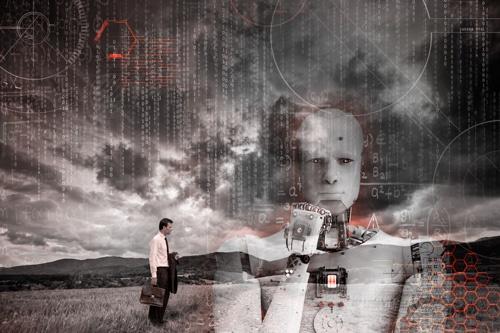“We’re working on two areas to improve confidentiality of cloud computing.” — Jon Crowcroft
Data and the intelligence that can be gained from it is seen as a solution to solving many of the world’s largest challenges, but despite the great opportunities, there are also significant risks. Data-based companies use data to make money. As computer systems become increasingly centralized and ubiquitous, the possibility for widespread security breaches becomes a risk, and we’ve already seen the devastating consequences, e.g. the Cambridge Analytica Scandal.
Jon Crowcroft, the Marconi Professor of Communications Systems at the Alan Turing Institute – University of Cambridge, has researched these issues throughout his career in computer science. Crowcroft started in the Cambridge computer lab 18 years ago. Together with colleagues Ian Pratt and Steven Hand, they worked on a software known as Xenoservers, which allows multiple operating systems to coexist on the same hardware. The group developed a software company that became widely utilized by businesses like Amazon. Additionally, Crowcroft collaborated with Docker, a company whose services are used by eBay, Microsoft, Google, and others. Today, as Chair of the Programme Committee at the Turing Institute, he’s focusing on the confidentiality and personalization of cloud computing.
Jon is an advocate for the democratization of artificial intelligence and machine learning. The Global Search for Education welcomes Jon Crowcroft to talk about privacy, security and what’s next in the age of big data.

“Most critical infrastructure is heavily defended through firewalls and other techniques. This is very important, but people make mistakes.” — Jon Crowcroft
Jon, how can we improve confidentiality in cloud computing and what are the key opportunities and issues you see?
We’re working on two areas to improve confidentiality of cloud computing. First, we’re using new hardware that allows us to protect data during computation, a thing called a Trusted Execution Environment. This lets cloud systems offer secure enclaves where there is much less chance of accidental leak of data, or bad guys hacking in and stealing our personal information. Our second line of attack is to keep personal data on personal computers (tablets, phones, home servers) and move computation to the data, rather than moving the data all to one big central data center.
One possible direction is that people will be able to be paid for contributing data. Another possibility is that there could be many more apps for doing interesting things with data—not just from personal devices, but from sensors around the world (smart homes, cities, cars). These can be combined to improve our health and security and general wellbeing, but all without a massive loss of privacy.
Computers can be taught to learn from data without being programmed. Indeed, computers as we know them now will completely disappear. What are the innovations that excite you the most for the next 5 or 10 years?
Most people already experience the Internet, Web and Cloud through interfaces that are heavily personalized. The analytics behind cloud services have mostly been aimed at improving accuracy of recommendations, targeted advertisements, or market research. As systems pervade our lives through mobile communications gadgets including wearables, more personally useful and less attention-grabbing things can be done with the data. As mentioned above, much can be done to improve health and wellbeing and safety. The recommendations might improve quality of life, but the large-scale analytics behind them can also be repurposed to improve our knowledge of what works in terms of preventing medical conditions or what improves education and training in ways that can be hard to envisage just yet.

“Today, people can use a word processor or a private communications tool like Whatsapp, or a music composition assistant like Sibelius or Logic. But, I think in the future, people should as easily be able to check facts or even models using simple interfaces that let them use all the power of analytics engines.” — Jon Crowcroft
Let’s talk about deep learning technologies – the number of different AI applications for deep learning continues to grow. How will researchers analyze online data while at the same time keep people’s personal information confidential and secure from hackers?
Some of the secure cloud techniques allow training neural nets privately. However, you need further techniques to prevent the trained classifiers from revealing their training data. There are ways to do this, but it is not completely known how well these work. We shall see.
What if someone decides to mess with our water quality or electricity delivery – can you catch them? What controls and regulations do governments and nations need to put in place now for this new age to protect our vital systems?
Most critical infrastructure is heavily defended through firewalls and other techniques. This is very important, but people make mistakes. As more smarts are connected to the public internet and to vital supplies of power, clean water, and other resources, we’re going to need more care and much more attention to the security mechanisms. Sadly, so far in recent years, things have gone in the opposite direction with less care being paid to these concerns.
What are your predictions for the extent of the roles of computers? What are the tips you would give the next generation about being future ready to co-exist with them?
One thing I would hope for is the democratization of machine learning and AI, so that citizens become able to make use of the tools. Today, people can use a word processor or a private communications tool like Whatsapp, or a music composition assistant like Sibelius or Logic. But, I think in the future, people should as easily be able to check facts or even models using simple interfaces that let them use all the power of analytics engines. However, this will still need people able to think both computationally and to have a baseline understanding of statistics.

“Through control of information in smaller and smaller numbers of global monopolies, data creeps out of just Internet and Cloud into all areas of life, including health, education, and politics. To counteract that we need to think about what values we want.” –– Jon Crowcroft
What are your top predictions as to how society as a whole will benefit from this break through new world? What are your greatest fears and are there any fundamental steps you would like to see taken now to avert them?
Various writers have covered this; probably Jaron Lanier’s “Who Owns the Future” is the best fact-based book about the risk of increasing centralization of power. Through control of information in smaller and smaller numbers of global monopolies, data creeps out of just Internet and Cloud into all areas of life, including health, education, and politics. To counteract that we need to think about what values we want. Cory Doctorow, a tech writer who also creates fiction, has some optimistic ideas in books like Makers and Walkaway.
How do companies, public institutions and governments develop secure systems for preventing unwanted intrusions into their systems? Is the solution to cyberwarfare going to be retaliation measures? Is there a defensive strategy that is feasible?
There are two directions for cyberdefense. One is to re-decentralize; the original design goal of the Internet was to withstand nuclear attack by being decentralized, and we’ve lost sight of that. The other is to employ diversity. If everyone was exactly the same (a clone), then one small change can result in the end of all of them. This is happening with the world’s most popular banana today, where a new blight is killing off all the crops of this fruit, which was created from a single clone. The same can happen to software systems, where a single attack (or even mistake) works on everything in one day. Today we only have a few types of systems. Think about smart phones, Android or iPhone? Or about the cloud, do you use Facebook or Instagram? Not too smart.
